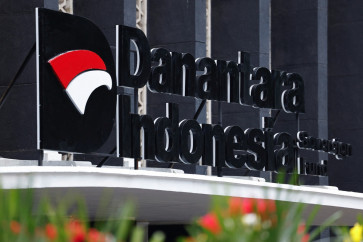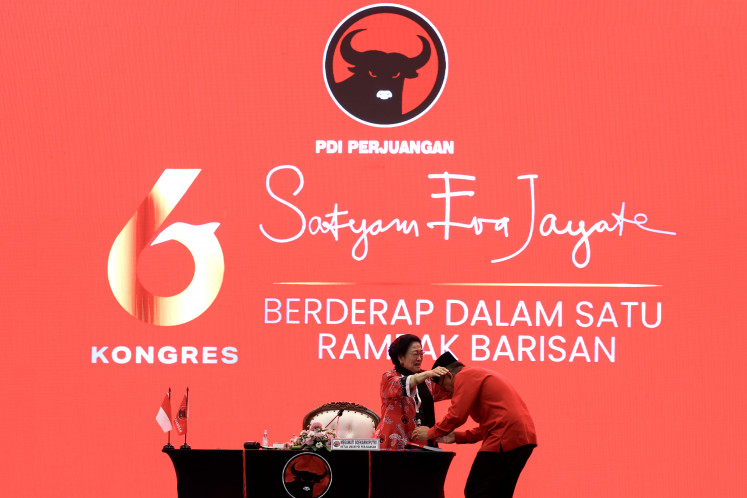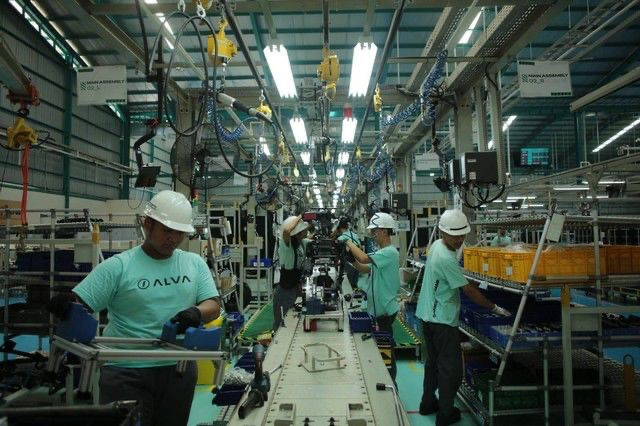Popular Reads
Top Results
Can't find what you're looking for?
View all search resultsPopular Reads
Top Results
Can't find what you're looking for?
View all search resultsThai firm hopes for business as usual despite lawsuit
Thailand’s state-owned oil and gas explorer PTT Exploration and Production Pcl (PTTEP) has reiterated its commitment to invest in Indonesia despite the government’s recent decision to sue the company for Rp 27
Change text size
Gift Premium Articles
to Anyone
T
hailand’s state-owned oil and gas explorer PTT Exploration and Production Pcl (PTTEP) has reiterated its commitment to invest in Indonesia despite the government’s recent decision to sue the company for Rp 27.4 trillion (US$2.06 billion) over environmental damage it allegedly caused in the Timor Sea eight years ago.
One of the firm’s subsidiaries, PTTEP Australasia, had its Montara wellhead in the Timor Sea catch fire in 2009, resulting in the leak of hundreds of thousands of liters of oil off the northern coast of Western Australia.
A Darwin court fined PTTEP Australasia $394,000 after the company pleaded guilty in 2011 to charges related to reckless operations.
On May 3, the government registered a lawsuit against PTTEP and PTTEP Australasia at the Central Jakarta District Court because the government alleged the oil spill had also fouled seawater and coastal areas in East Nusa Tenggara (NTT) province.
The government is seeking compensation of Rp 23 trillion in return for the alleged damage and Rp 4.4 trillion in restoration costs.
However, “PTTEP Indonesia hopes that we can still invest in Indonesia without being distracted by that case involving our sister company,” PTTEP Indonesia general affairs manager Afiat Djajanegara said during a recent media visit to The Jakarta Post.
“We want to make it clear that the [oil spill] case has nothing to do with PTTEP Indonesia,” Afiat said. “So, what we want is to see our business running as usual in Indonesia, while the case in Australia is being processed.”
Afiat said that Indonesia was a “tier 1” market for the company, which currently operates 40 oil and gas projects in 11 countries worldwide.
PTTEP Indonesia previously operated two offshore oil and gas blocks, South Mandar and Malunda, in the Makassar Strait, West Sulawesi.
It decided to release the ownership of those blocks in 2015, following a drastic drop in global oil prices that made its operations economically unfeasible.
Within the past two years, the company has been hunting for new oil and gas blocks off Java and Sumatra, which it deems would be more attractive because of the presence of better infrastructure than what is in the eastern part of Indonesia.
It particularly seeks blocks with a minimum production capacity of 5,000 barrels of oil per day and aims to seal a deal within the next one or two years.
Parent company PTTEP has prepared about $10 billion in capital expenditure for its global expansion, including in Indonesia.
PTTEP Indonesia has been offered an 11.5 percent stake to jointly operate the gas-rich East Natuna block along with state-owned energy giant Pertamina and the United States-based oil conglomerate ExxonMobil.
The companies have yet to sign the contract for the East Natuna block because all stakeholders are currently evaluating the agreement’s details, especially considering the gross-split sliding scale scheme for upstream oil and gas sector that was recently launched by the government.
“We’ve been offered to team up [with Pertamina and ExxonMobil]. However, there’s still a process to go through before we finally reach an agreement. Moreover, we have to do some recalculations under the gross-split scheme,” Afiat explained.
Many companies have voiced concerns over the unattractiveness of the gross-split sliding scale, which releases the government from the duty to reimburse contractors for their exploitation costs during the length of their contracts, forcing companies to carry the burden of these costs by themselves.
The new scheme has been implemented on the backdrop of bleak prospects for the oil and gas industry in this country, which has been reflected by the amount of investments made from 2014 to 2016.
Investment in the upstream sector plunged to an annual figure of $11 billion during the period compared to more than $20 billion per year during oil’s heyday.
The 2016 Policy Perception Index survey released by a conservative Canadian think tank, the Fraser Institute, highlights the trend.
Indonesia sits at 79th place among 96 jurisdictions, with a reserve-replacement-ratio (RRR) of 51 percent, indicating the country’s poor investment climate in the oil and gas sector.










